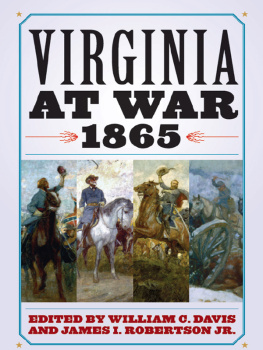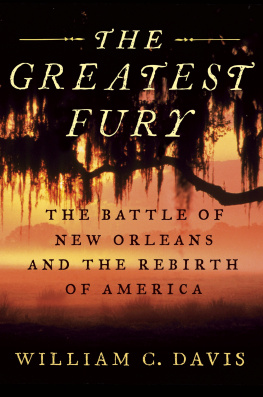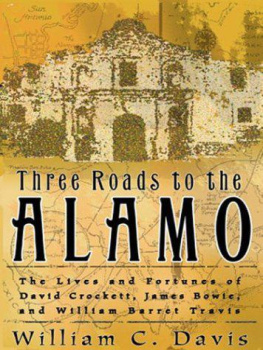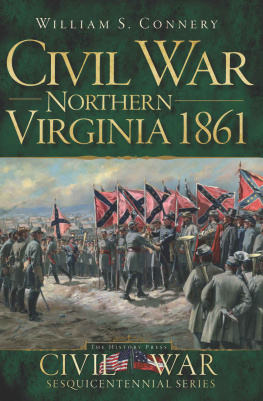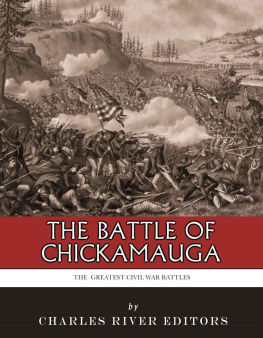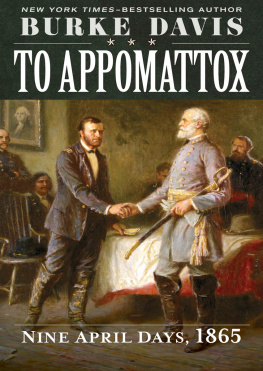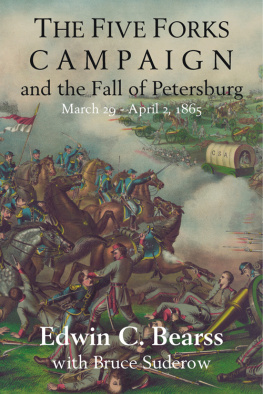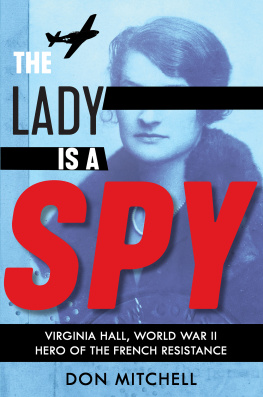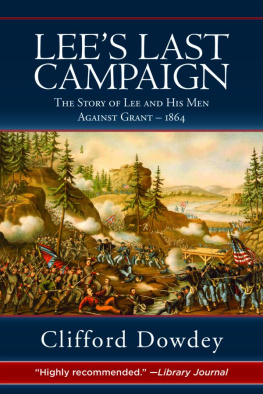VIRGINIA
AT WAR
1865
Edited by William C. Davis
and James I. Robertson Jr.
for the Virginia Center for Civil War Studies

THE UNIVERSITY PRESS OF KENTUCKY
Virginia at War, 1865
Copyright 2012 by The University Press of Kentucky
Scholarly publisher for the Commonwealth,
serving Bellarmine University, Berea College, Centre College of Kentucky, Eastern Kentucky University, The Filson Historical Society, Georgetown College, Kentucky Historical Society, Kentucky State University, Morehead State University,
Murray State University, Northern Kentucky University, Transylvania University, University of Kentucky, University of Louisville, and Western Kentucky University.
All rights reserved.
Editorial and Sales Offices: The University Press of Kentucky
663 South Limestone Street, Lexington, Kentucky 40508-4008
www.kentuckypress.com
12 13 14 15 16 5 4 3 2 1
Library of Congress Cataloging-in-Publication Data
Virginia at war, 1865 / edited by William C. Davis and James I. Robertson Jr., for the
Virginia Center for Civil War Studies.
p. cm.
Includes bibliographical references and index.
ISBN 978-0-8131-3468-0 (hardcover : alk. paper) ISBN 978-0-8131-3469-7 (ebook) 1. VirginiaHistoryCivil War, 1861-1865. 2. VirginiaHistoryCivil War, 1861-1865Social aspects. 3. VirginiaHistoryCivil War, 1861-1865Campaigns.
4. United StatesHistoryCivil War, 1861-1865Social aspects. 5. United StatesHistoryCivil War, 1861-1865Campaigns.
I. Davis, William C., 1946- II. Robertson, James I. III. Virginia Center for Civil War Studies.
E534.V396 2012
975.5'03dc23 2011032982
This book is printed on acid-free paper meeting the requirements of the American National Standard for Permanence in Paper for Printed Library Materials.

Manufactured in the United States of America.
 | Member of the Association of
American University Presses |
Contents
Chris Calkins
Ginette Aley
Jaime Amanda Martinez
E. Lawrence Abel
F. Lawrence McFall Jr.
Kevin Levin
Ervin L. Jordan Jr.
John M. McClure
Judith Brockenbrough McGuire
Edited by James I. Robertson Jr.
Preface
The war had to end eventually, and by the time 1865 dawned, there were few in the Old Dominion who could continue to ignore the stark realities before them that the end was not going to be a happy one for Virginians. After more than three and one-half years of conflict, the state was reeling. Most of northern Virginia was lost to the Yankees, most of the Shenandoah Valley was gone, the far western part of the state was now West Virginia and completely lost, and the Tidewater was largely in enemy hands. For all practical purposes, Confederate Virginia was little more than Richmond and Petersburg, and a scattering of supply depots and bases on the Southside at Danville and Lynchburg. More to the point, by January 1865 Confederate Virginialike the Confederacy itselfresided chiefly in Robert E. Lees army.
The state was exhausted. Almost all of its railroad mileage lay in enemy hands or had been torn up. Even though commissary wagons still managed to collect considerable amounts of grain and meat, the government no longer had the ability to deliver it to the places that needed it most. Fields in the Valley were close to exhaustion, while barns and pastures were depopulated as the army swallowed most of the livestock. Communications were all but restricted to courier as most telegraph lines went silent. Most newspapers had ceased publication, and most schools had closed. Business stagnated and currency was inflated to the point of worthlessness. With the rest of the Confederacy in even worse shape, little help was available to alleviate the states shortages.
Most of all, the exhaustion of the war told on the faces of the people, both soldiers and civilians at home. Children had lost their childhood. Too many parents had lost sons, and too many wives husbands. Three years of relentless bad news from west of the Appalachians sapped the optimism from people who had seen most of the Confederacys successes on their doorsteps. For the first time desertion became an epidemic problem for Lees army as thousands of men finally decided that their first loyalty was to their hard-pressed families at home, and others simply lost heart and gave up. Words like hope and victory had simply faded from their vocabularies, and January 1865 gave little promise of their return.
Indeed, as Chris Calkins demonstrates in his opening essay on the military operations in the state in 1865, there were few, if any, reasons for optimism. General Lee himself almost certainly felt it was futile to continue after the reelection of Abraham Lincoln in November 1864 demonstrated that the North had the will to continue the war another four years if necessary. After a long career with the National Park Service at Petersburg National Battlefield Park, Calkins spearheaded the development of Sailors Creek Battlefield State Park in Virginia, and in 2009 became its first manager. He is the author of Thirty-Six Hours Before Appomattox, the only modern history of Sailors Creek, and also of The Appomattox Campaign, From Petersburg to AppomattoxA Tour Guide to the Routes of Lees Withdrawal and Grants Pursuit, April 29, 1865, and Lees Retreat: A History and Field Guide.
Any work on the Confederacy has to confront the ravages to society and family life on the home front, and Virginia suffered more than any other state thanks to its hosting the war on its hearth for four years. Examining the life of women and children on the home front is Ginette Aley, assistant professor of history at Washburn University at Topeka, Kansas. A contributor to the 1864 volume in this series, she specializes in agricultural history.
Jaime Amanda Martinez, who did her doctoral dissertation at the University of North Carolina at Pembroke on the conscription of slaves in the Confederacy, contributes an essay on wartime economy to this volume. At the University of Virginia she worked on the acclaimed Valley of the Shadow digital archive, a path-breaking endeavor comparing the wartime experiences of a Virginia county and a Pennsylvania county.
Though Virginians may not have had much to sing about in 1865, song and music were vital elements in maintaining patriotism and morale during the war for civilians and soldiers alike. E. Lawrence Abel is an authority on Civil Warera music in addition to being a professor of psychology at Wayne State University in Detroit. His book Singing the New Nation: How Music Shaped the Confederacy, 18611865 appeared in 2000 and is still the finest work on the subject.
Appropriately, the story of Danvilles few days as capital of the Confederacy is written by a fifth-generation son of Danville, F. Lawrence McFall Jr. He is the author of Danville in the Civil War and The Fortification of Danville, Virginia, during the War between the States, 18611865. For many years he has been active with the Danville Museum of Fine Arts and History and the Danville Historical Society in studying and preserving the story of the last capital of the Confederacy.
Little or no work has been done for many years on the story of the demobilization of the Civil War armies on either side. Kevin Levin rectifies that omission with his contribution on the demobilization of Lees army. He has published numerous articles on the Civil War experience in scholarly journals and is the author of a forthcoming book on the battle of the Crater and its role in Civil War memory. He is currently a high school teacher at St. AnnesBelfield School in Charlottesville.
Next page
